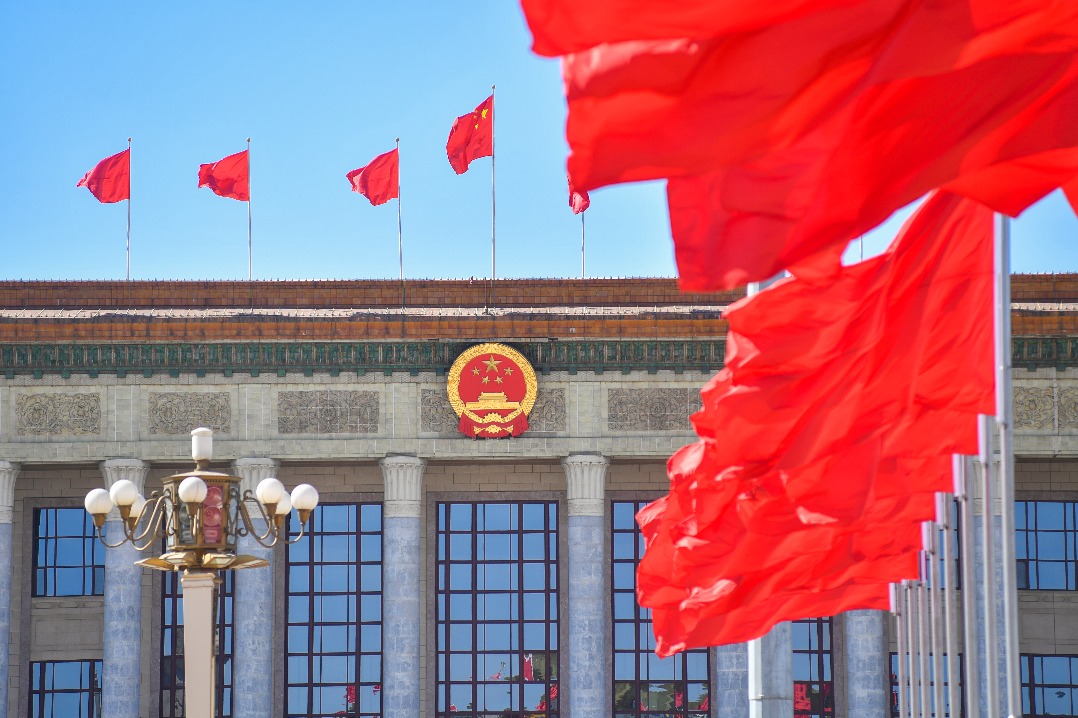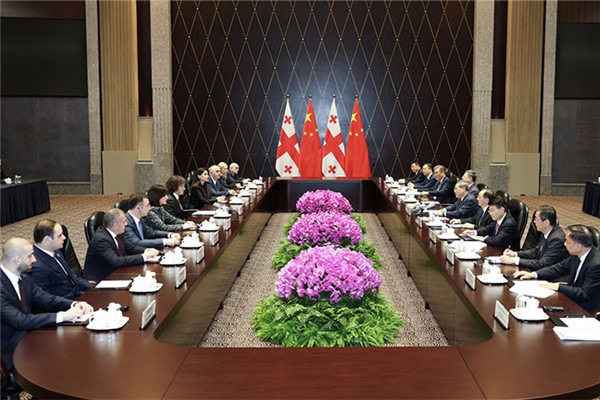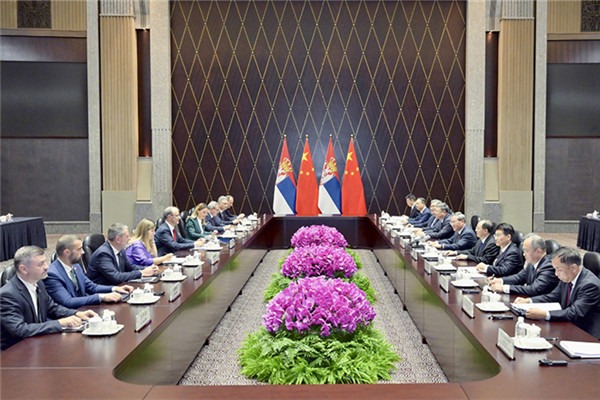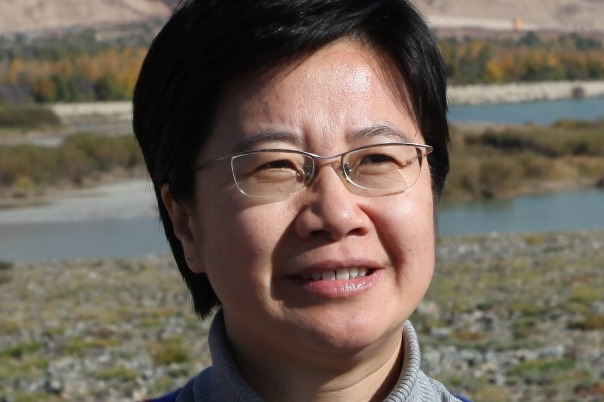Higher-level opening-up to offer new possibilities


China's drive to advance reform and development through higher-level opening-up — a priority for the country's development over the next five years — will unlock fresh momentum for multinational corporations and trading partners, business leaders and market watchers said.
Highlighting the key roles of expanding opening-up at the institutional level, safeguarding the multilateral trading system and promoting broader international economic flows, they said these measures will help spur new growth drivers and enhance resilience against risks brought about by rising protectionism and geopolitical uncertainties.
Their comments came as the Recommendations of the Central Committee of the Communist Party of China for Formulating the 15th Five-Year Plan for National Economic and Social Development stressed the idea to "share opportunities and achieve common development with the rest of the world".
A communique issued on Oct 23 after the conclusion of the fourth plenary session of the 20th CPC Central Committee, during which participants deliberated on the recommendations, stated that China should take the initiative to open wider to the world, promote the innovative development of trade, create greater space for two-way investment cooperation, and pursue high-quality Belt and Road cooperation.
Noting that China aims to sustain long-term growth momentum and contribute to global economic stability, Mei Xinyu, a researcher at the Chinese Academy of International Trade and Economic Cooperation in Beijing, said that expanding institutional opening-up and promoting fairer, rules-based trade will not only attract quality foreign investment but also strengthen global confidence in China's development path.
Encouraged by China's latest push to advance high-standard opening-up, Poh-Yian Koh, president for China at FedEx Corp, said the United States-based express transportation service provider will remain a steadfast supporter of and advocate for global trade.
"We are confident that these policy directions will further expand market access, foster a more enabling business environment, and unlock broader opportunities for foreign businesses, all of which will continue to drive our growth in China," Koh said.
Operating more than 300 international flights to and from China each week, she noted that the country serves as one of the key engines of global trade and an integral part of FedEx's global strategy.
"Since entering the Chinese market over four decades ago, we have achieved substantial growth here, while both contributing to and benefiting from the country's ongoing opening-up," Koh added.
Such optimism is echoed by other foreign business leaders who see renewed impetus for cooperation emerging from China's latest policy blueprint.
Jens Eskelund, president of the European Union Chamber of Commerce in China, noted that it is a positive sign that the communique outlined the need for the Chinese government to see that new demand drives new supply. "New supply helps create fresh demand, and that positive interactions are fostered between consumption and investment and between supply and demand," said Eskelund.
Joe Bao, executive vice-president for China at Kone Corp, the Finnish multinational elevator manufacturer with over 60,000 employees globally, said his company is encouraged to see that the recommendations of the CPC Central Committee for formulating the 15th Five-Year Plan place a strong emphasis on new urbanization, with elevator modernization playing a pivotal role in shaping smarter, more sustainable cities.
To secure more orders, the Finnish company completed its largest elevator modernization project in Kunshan, Jiangsu province, earlier this year, and has built a presence in more than 40 Chinese cities.
"Building on this momentum, we will increase our investments in the Guangdong-Hong Kong-Macao Greater Bay Area, one of China's most dynamic city clusters," said Bao. "This will strengthen local innovation, bring us closer to our customers and position us to capture the next wave of opportunities in China's ongoing urban transformation."
Swiss technology company ABB Group will also deepen its footprint in China to support the country's rapid energy transition and industrial electrification during the 15th Five-Year Plan (2026-30) period, while leveraging locally developed innovations to deliver practical technical solutions to global markets.
Adrian Guggisberg, president of ABB's distribution solutions division, said that as China has become ABB's global anchor for innovation, talent and technology export, the company will expand both innovation and manufacturing capacity in China, increasing investment in flexible and digital power solutions.
Under its long-term plan, ABB will work with Chinese partners to capture opportunities in urbanization, electrification and digitalization in both China and other parts of the world, especially from economies participating in the Belt and Road Initiative.
Chen Jianwei, a researcher at the University of International Business and Economics' Academy of China Open Economy Studies, said China's new round of high-level opening-up will further integrate global trade, capital and innovation with its vast domestic market, and unite more countries to strengthen cooperation in addressing shared economic challenges.
For example, China and the Association of Southeast Asian Nations signed the Free Trade Area 3.0 Upgrade Protocol in Kuala Lumpur, Malaysia, on Oct 28, injecting new momentum and confidence into both regional and global growth.
"The steady inflow of investment from developed and emerging economies also shows that global businesses continue to view China as a key growth engine and a stabilizing force amid global uncertainty," he added.
China attracted 573.75 billion yuan ($80.68 billion) in foreign direct investment in the first three quarters of 2025, while FDI from Japan, the United Arab Emirates, the United Kingdom and Switzerland surged 55.5 percent, 48.7 percent, 21.1 percent and 19.7 percent year-on-year, respectively, during this period, data from the Ministry of Commerce showed.
Despite mounting global economic headwinds and uncertainties over the global trade situation, FDI in China rose 11.2 percent from a year earlier in September alone.
zhongnan@chinadaily.com.cn
- China announces top journalism award winners
- Party plenum: Charting the course for the 15th Five-Year Plan period (2026-30)
- China postpones Shenzhou XX return mission
- Chinese authorities call for broader AI application in health sector
- HKU leads as 5 Hong Kong universities make Asia's top 10 in QS rankings
- Historians on both sides of Taiwan Strait urge defense of historical truth of Taiwan's restoration




































